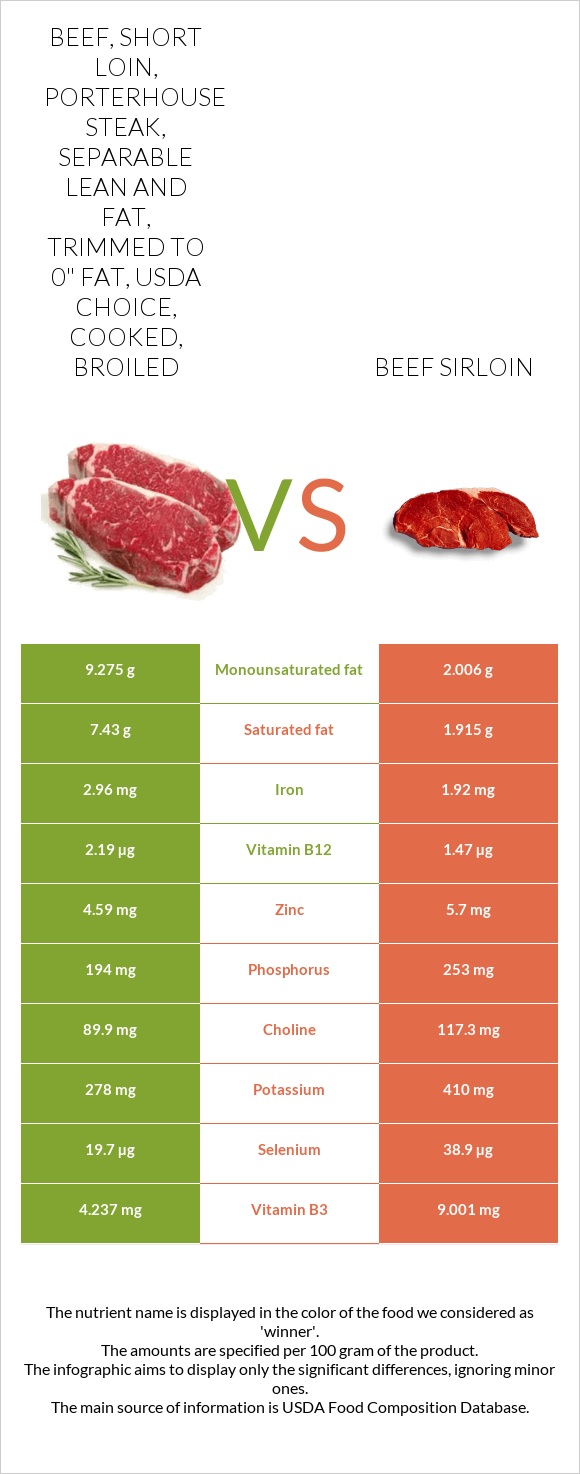Beef, short loin, porterhouse steak, separable lean and fat, trimmed to 0" fat, USDA choice, cooked, broiled vs. Beef sirloin — In-Depth Nutrition Comparison
Compare
What are the main differences between beef, short loin, porterhouse steak, separable lean and fat, trimmed to 0" fat, USDA choice, cooked, broiled and beef sirloin?
- Beef, short loin, porterhouse steak, separable lean, and fat, trimmed to 0" fat, USDA choice, cooked, broiled is richer in vitamin B12, iron, and vitamin B2, yet beef sirloin is richer in selenium, vitamin B3, vitamin B6, zinc, phosphorus, and vitamin B5.
- Beef sirloin's daily need coverage for selenium is 35% higher.
- Beef, short loin, porterhouse steak, separable lean, and fat, trimmed to 0" fat, USDA choice, cooked, broiled has 4 times more saturated fat than beef sirloin. Beef, short loin, porterhouse steak, separable lean, and fat, trimmed to 0" fat, USDA choice, cooked, broiled has 7.43g of saturated fat, while beef sirloin has 1.915g.
We used Beef, short loin, porterhouse steak, separable lean, and fat, trimmed to 0" fat, USDA choice, cooked, broiled and Beef, top sirloin, steak, separable lean only, trimmed to 0" fat, select, cooked, broiled types in this comparison.
Infographic

Infographic link
Mineral Comparison
Mineral comparison score is based on the number of minerals by which one or the other food is richer. The "coverage" charts below show how much of the daily needs can be covered by 300 grams of the food.
| Contains more IronIron | +54.2% |
| Contains more CopperCopper | +52.9% |
| Contains more ManganeseManganese | +36.4% |
| Contains more MagnesiumMagnesium | +22.7% |
| Contains more CalciumCalcium | +214.3% |
| Contains more PotassiumPotassium | +47.5% |
| Contains more ZincZinc | +24.2% |
| Contains more PhosphorusPhosphorus | +30.4% |
| Contains more SeleniumSelenium | +97.5% |
Vitamin Comparison
Vitamin comparison score is based on the number of vitamins by which one or the other food is richer. The "coverage" charts below show how much of the daily needs can be covered by 300 grams of the food.
| Contains more Vitamin B1Vitamin B1 | +13.6% |
| Contains more Vitamin B2Vitamin B2 | +41.1% |
| Contains more Vitamin B12Vitamin B12 | +49% |
| Contains more Vitamin EVitamin E | +116.7% |
| Contains more Vitamin B3Vitamin B3 | +112.4% |
| Contains more Vitamin B5Vitamin B5 | +92.1% |
| Contains more Vitamin B6Vitamin B6 | +85.6% |
| Contains more FolateFolate | +42.9% |
| Contains more CholineCholine | +30.5% |
All nutrients comparison - raw data values
| Nutrient |  |
 |
DV% diff. |
| Selenium | 19.7µg | 38.9µg | 35% |
| Vitamin B12 | 2.19µg | 1.47µg | 30% |
| Vitamin B3 | 4.237mg | 9.001mg | 30% |
| Saturated fat | 7.43g | 1.915g | 25% |
| Vitamin B6 | 0.367mg | 0.681mg | 24% |
| Fats | 20.15g | 5.03g | 23% |
| Monounsaturated fat | 9.275g | 2.006g | 18% |
| Protein | 23.61g | 30.8g | 14% |
| Iron | 2.96mg | 1.92mg | 13% |
| Zinc | 4.59mg | 5.7mg | 10% |
| Phosphorus | 194mg | 253mg | 8% |
| Vitamin B5 | 0.316mg | 0.607mg | 6% |
| Choline | 89.9mg | 117.3mg | 5% |
| Vitamin B2 | 0.23mg | 0.163mg | 5% |
| Calories | 283kcal | 177kcal | 5% |
| Copper | 0.13mg | 0.085mg | 5% |
| Cholesterol | 69mg | 81mg | 4% |
| Potassium | 278mg | 410mg | 4% |
| Polyunsaturated fat | 0.676g | 0.185g | 3% |
| Calcium | 7mg | 22mg | 2% |
| Magnesium | 22mg | 27mg | 1% |
| Vitamin B1 | 0.1mg | 0.088mg | 1% |
| Folate | 7µg | 10µg | 1% |
| Vitamin K | 1.4µg | 1% | |
| Vitamin E | 0.18mg | 0.39mg | 1% |
| Sodium | 65mg | 66mg | 0% |
| Manganese | 0.015mg | 0.011mg | 0% |
| Tryptophan | 0.255mg | 0.202mg | 0% |
| Threonine | 1.088mg | 1.23mg | 0% |
| Isoleucine | 1.21mg | 1.401mg | 0% |
| Leucine | 2.075mg | 2.45mg | 0% |
| Lysine | 2.202mg | 2.603mg | 0% |
| Methionine | 0.666mg | 0.802mg | 0% |
| Phenylalanine | 1.018mg | 1.217mg | 0% |
| Valine | 1.269mg | 1.528mg | 0% |
| Histidine | 0.764mg | 0.983mg | 0% |
Macronutrient Comparison
Macronutrient breakdown side-by-side comparison
Protein:
23.61 g
Fats:
20.15 g
Carbs:
0 g
Water:
53.95 g
Other:
2.29 g
Protein:
30.8 g
Fats:
5.03 g
Carbs:
0 g
Water:
63.58 g
Other:
0.59 g
| Contains more FatsFats | +300.6% |
| Contains more OtherOther | +288.1% |
| Contains more ProteinProtein | +30.5% |
| Contains more WaterWater | +17.8% |
~equal in
Carbs
~0g
Fat Type Comparison
Fat type breakdown side-by-side comparison
Saturated fat:
Sat. Fat
7.43 g
Monounsaturated fat:
Mono. Fat
9.275 g
Polyunsaturated fat:
Poly. Fat
0.676 g
Saturated fat:
Sat. Fat
1.915 g
Monounsaturated fat:
Mono. Fat
2.006 g
Polyunsaturated fat:
Poly. Fat
0.185 g
| Contains more Mono. FatMonounsaturated fat | +362.4% |
| Contains more Poly. FatPolyunsaturated fat | +265.4% |
| Contains less Sat. FatSaturated fat | -74.2% |